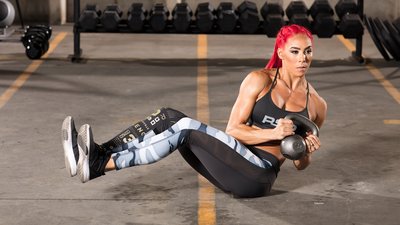It's all too easy to take a negative approach to fitness at the start of the year; those early workouts feel like self-inflicted punishment. The physical soreness chips away at your mental resolve. The road from "here" to "anywhere" feels so long that that you find it hard to remember why you're doing this.
"You owe it to yourself to live a healthy lifestyle," says RSP athlete and gym owner Hannah Eden. "Honor your body!"
We want to help you do it. So with that in mind, here are 13 beginner-oriented tips to help you surprise yourself, stick with it, and get seriously fit.
1. You have to show up before you can grow up
You may have been in shape years ago. Or maybe you've never been what you'd consider "fit." RSP Nutrition Athlete Kieon Dorsey says it's important to set goals you can reasonably expect to reach. And one of those is to keep coming back over and over again.
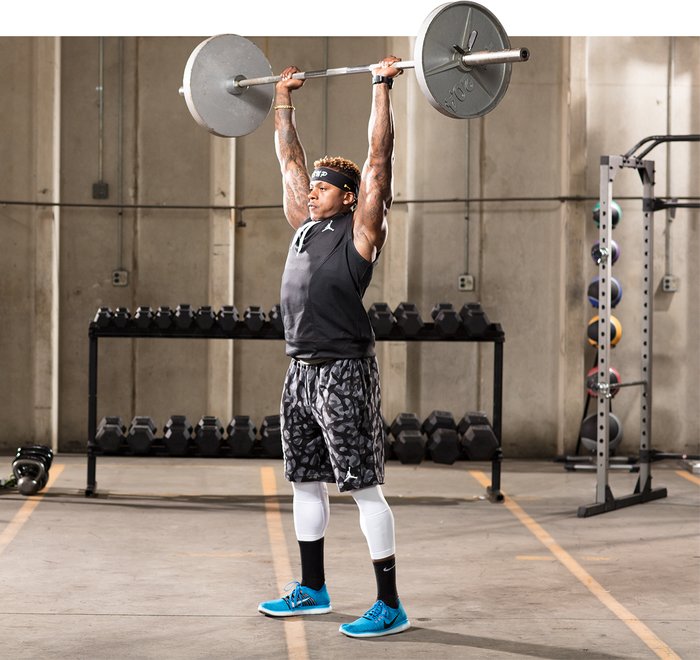
"You have to realize that you didn't get where you are now in just three weeks, or three months, or even three years," says Dorsey. "It took a lot of time for you to get where you are now, and results aren't coming overnight. Instead, they build up over time, with consistency, patience, and hard work."
"The number one thing you can do for yourself is show up," Dorsey says. "No matter how you feel, just keep showing up."
2. If you can't keep yourself honest, enlist someone who can
"All too often, it's those morning runs or evening workouts that get pushed to the back burner. A good gym partner can keep you motivated, on track, and consistent," says RSP athlete Curtis Bartlett, founder of Police Fitness, an online training service. "You'll be less inclined to skip workouts if you know someone else is counting on you to be there for them."
But even if you don't have a lifting partner, let your community in on your journey! If you've set a fitness goal for yourself, don't keep it a secret. Tell people who can help you stay on track. Whether it's a friend, family member, or significant other, find someone supportive—but unafraid to tell you the hard truth when you need it.
3. Don't leap into a specialized program
Competition-inspired training styles like powerlifting programs, daily CrossFit WODs, and intense bodybuilding splits will always have an allure, but they're not for everyone. In both their recovery demands and time commitment, they're often unforgiving to a degree that noncompetitors (i.e., nearly all of us) can't be expected to live up to.
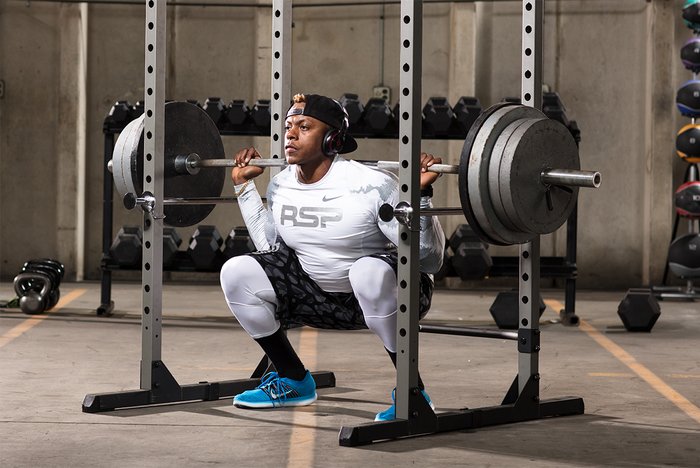
On the other hand, trying to cram strength, muscle, and conditioning into every workout can also lead you to burn out, especially if you're acting as your own coach. The answer may be to hand the reins to someone else, like RSP athletes Dorsey, Bartlett, and Eden.
RSP's new free training program Triple Threat is four-week plan that provides a perfect balance of strength, muscle, and conditioning work, with one of the coaches managing each style of training. Some days, you'll focus on just one attribute. On others, you'll blend them. But the goal is always the same: creating a balanced, capable athlete.
The best thing about Triple Threat is that it can morph to your goals. You can make it a fat-loss program or a muscle-gain program, depending on the nutritional path you take.
4. Make warm-ups matter
It's tempting to stroll into the gym and go hard right from the start, pushing yourself and trying to lift big weights. But an effective warm-up is the single-best way to maximize your performance and reduce the risk of injury.
Start your warm-up simply by, well, getting warm. You can't go wrong with 5-10 minutes of low-intensity cardio like riding a recumbent bike, jogging on a treadmill, or skipping rope.
Next, do some light sets of your first exercise. If you're going to do a barbell or machine bench press, pick a resistance you can easily rep 15-20 times. Use good form, and slowly work through a full range of motion on each rep for 2-3 sets. By going slowly, you'll pull blood into your targeted muscles to blood improves nutrient flow and improve muscle function.
This stuff doesn't feel like it matters. But it does! So take it seriously.
5. Do strength moves correctly before going heavier
As a beginner, you'll want to push yourself. Over the course of just a few workouts, you'll start to feel stronger, and your confidence will rise. This is where patience matters.
Here's a cardinal rule for all lifters, pros and novices alike: Don't increase the amount of weight you're handling until you've mastered the proper movement form. That means exerting complete control over both raising and lowering a weight, with picture-perfect form.
Here's one more all-too-uncommon bit of common sense for you: You're probably not the best person to say if your form is right-on. When you're getting started, taking video of your lifts and share them with someone who knows better than you. Ask them for their blunt feedback, and be prepared to listen to it!

6. Strive for personal bests, which aren't the same things as 1RMs
A foundational concept of strength training is "progressive overload," which is striving overtime to incrementally increase your workout with heavier weight, more reps, or shorter rest times. Progressive overload isn't about doing ever-longer routines; it's about making steady progress within your routine.
The best way to know if you are making progress is to keep close track of each workout: what exercises you did, the weight, number of reps and sets, and your rest time. With the numbers in front of you, you can evaluate your progress. Without them, you're just guessing.
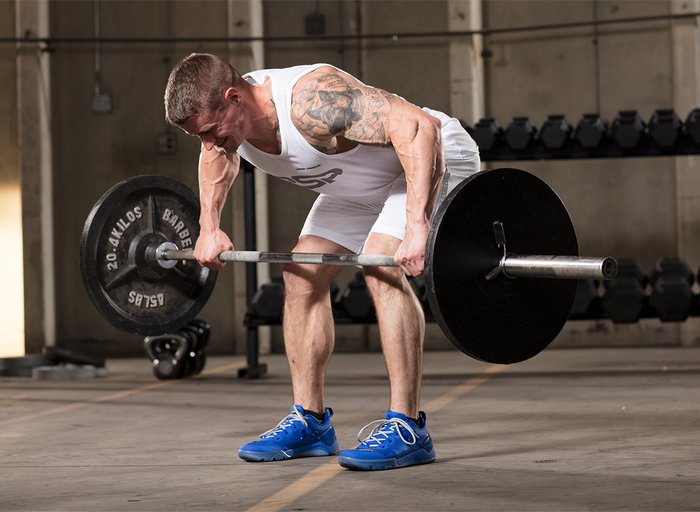
That said, going for big, triumphant 1RMs is overrated, especially in the early going of strength training. There's a lot to be risked and relatively little to be gained. That's why the strength routines in Triple Threat are built around tried-and-true rep ranges like 5 sets of 5, which allow you to get comfortable with heavy weights while still allowing you to rack up some quality volume.
7. Mind, meet muscle
Lifting is more than the physical act of moving iron. At its best—which is all we're really interested in here—it also involves focused attention: concentrating on the working muscle, visualizing it as it contracts and lengthens. This can be hard to do with, say, a squat or deadlift, but with muscle-focused work like lateral raises, curls, triceps push-downs, lat pull-downs, or rows, it's essential.
These types of movements are fundamental to muscle-growth and to workouts like Curtis Bartlett's hypertrophy-focused routines in Triple Threat. So approach them from a different perspective than big, complicated strength movements. Try to feel the muscle working, go slow, and control every inch of every rep.
8. Don't be afraid to fail sometimes
It's OK to reach a point of "momentary muscular failure" when you're lifting. This is that point where you can't do another rep with good form. No, you don't have to reach this point on every set you do, and there are certain movements where it's rarely if ever a good idea. That said, with the right movement at the right time, failure tells your body to adapt like nothing else can.
If your workout calls for you to go to muscle failure, but you're having trouble committing, don't be afraid to ask someone, such as your gym partner or someone else at the gym, for help. They can spot you and talk you past the pain so you can squeeze out one more rep. Once you know how it feels to reach failure, you'll feel more comfortable going back there the next time around.
9. Be safe, even when those around you aren't
In pretty much any weight room, you'll see safety rules being broken every day, all the time. People squat or bench heavy without spotters, move rattling barbells without collars, heave weights right next to your head, and leave dumbbells in unexpected places.
That's them. It doesn't have to be you. As a beginner, you should always slap a collar on a barbell so the weights won't fall off—even if it's a relatively light weight. Be sure to adjust the machines to fit your frame. Always make sure you have the necessary clear space around you for the exercise you're doing. And don't forget to put away your equipment when you're done...please!
10. Take your rest periods seriously
You just did a set. Now, how long until you start again? It's a timeless question, and an important one. A well-designed program like Triple Threat will include rest periods just like any other training variable.
When you're doing strength work, you'll often find yourself resting 2-3 minutes or more. Muscle-focused work, it's often 60-90 seconds. And when Hannah Eden's conditioning is on the menu...don't expect to rest much.
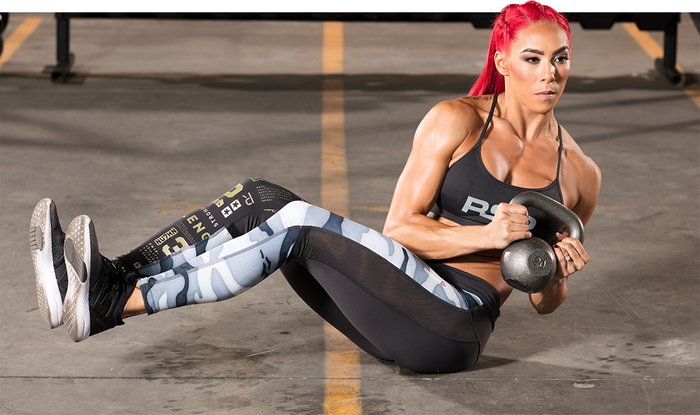
No matter how long you're resting, take that time seriously. Don't get caught up in long conversations, texting, or anything else that distracts from your task at hand. Socializing or playing with your smartphone (damn you, Super Stickman Golf 3) can derail even the best workout.
11. Be your own benchmark
"You'll always run into people who are stronger, faster, and better than you when it comes to training and fitness," Dorsey says. "You can't avoid it. But the only important competition is yourself."
Allow others to motivate and inspire you, but they're not the ones doing your work. It's all you! Base your progress on how far you've come from where you started, and celebrate all progress you make.
12. Make select changes to your diet
You may have heard the saying, "You can't out-train a bad diet." It's true, but it doesn't have to curse you to a monk-like diet for life.
"Many people make the effort to get to the gym but don't change anything about their old eating habits," says Bartlett. "When they don't see results, they give up or start gaining sloppy weight. You need to follow a dietary plan that supports your fitness goals."
Looking for one place that's often ripe for change? It's what's in your glass. "Not only does alcohol add extra unnecessary calories, but it also affects your metabolism and recovery," Bartlett explains. "More often than not, drinking leaves you dehydrated the following day. Even if you get yourself to the gym, your workout will suffer."
If you're wondering how much alcohol is too much, nutrition expert Paul Salter offers up a good limit that can go hand-in-hand with hard training: 1-2 drinks 1-2 times a week. Salter also wrote the Triple Threat Nutrition Guide, which offers enough tools and science to guide you through a serious transformation.
13. Don't overlook simple mental changes
RSP athlete and Los Angeles-based personal trainer Qimmah Russo meets plenty of people who are aspiring for dramatic physical transformations. When she does, she gives them this list to help make the inevitable challenges just a bit more manageable.
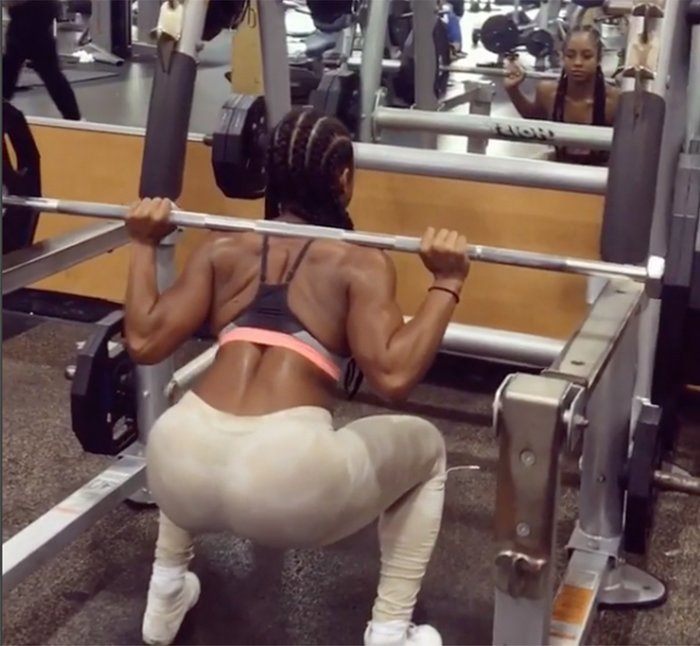
- Once you have your workout or program picked, focus on it. Ignore what others are doing.
- If it makes you more comfortable, wear layers or long sleeves to the gym. This might help you keep from fixating on what you look like in the hall of mirrors. It can also help boost your body heat.
- You wouldn't cheat on your partner, so don't cheat on your workouts or your meal plan, either. When you do, you're only cheating yourself.
- Take the time to prepare your own food whenever possible.
- If you're not drinking enough fluids, try using flavor enhancers like branched-chain amino acids.
- Sleep more. For most people, this should just say, "Go to bed earlier."
- Don't hang out in the gym for hours. Do your work, do it intensely, and leave.
- Keep your supplementation simple, and ritualized. A pre-workout 45 minutes before a workout, and a protein shake afterward, is a tried-and-true combo.
- Keep a photo or statement of your goals somewhere you can look at it every day to help you stay focused.
Got that photo or goal posted? Great. Now go make it real!

